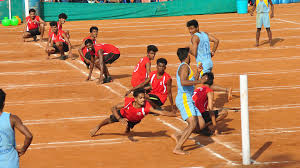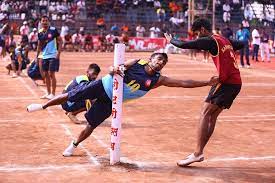
Physical Education Project On Kho Kho For Class 12 CBSE
Introduction
Kho Kho, a beloved gem within India’s rich cultural tapestry, encapsulates the essence of our heritage. This traditional Indian sport, deeply rooted in history, seamlessly weaves speed, agility, teamwork, and strategic brilliance into an exhilarating game. As we embark on this journey, our mission is to unravel the captivating narrative of Kho Kho, exploring its historical significance, intricate rules, nuanced techniques, and the myriad benefits it bestows upon its players.
Historical Background
Kho Kho, often referred to as the “Game of Chasers,” is a traditional Indian sport with a rich and storied history. Its origins can be traced back to the state of Maharashtra in western India, where it was known by various names like “Lingorcha” or “Run Chase.” While the exact timeline of its inception remains uncertain, Kho Kho has been a part of India’s cultural heritage for centuries.
The Evolutionary Tale
Kho Kho’s journey through time is a testament to its enduring popularity. In its nascent days, it served as a simple pastime for rural communities, played amidst sprawling fields devoid of standardized regulations. As its prominence surged, formal rules and guidelines took shape, ensuring fairness and consistency in play.
A Glimpse into Ancient Chronicles
References to Kho Kho can be unearthed in several ancient Indian texts, underscoring its significance in traditional Indian society. The Mahabharata, the epic of epics, even hints at a game resembling Kho Kho, with tales of Lord Krishna and his companions engaging in similar pursuits during their youth.
Cultural Resonance
Kho Kho’s historical relevance transcends the realm of sports. It mirrors the cherished values of physical prowess, agility, and teamwork entrenched in Indian culture for centuries. Its inclusion in cultural festivities and events is a testament to its timeless allure.
Objective of the Game
The Heart of Kho Kho
At its core, Kho Kho beckons teams to tag all their opponents swiftly while evading tags themselves. This seemingly straightforward objective lies at the crux of the game, birthing numerous virtues:
- Team Unity: Kho Kho dances to the rhythm of teamwork, where coordination and collaboration reign supreme. Players must synchronize their efforts strategically to tag opponents with finesse. Effective communication within the team is the cornerstone of success.
- Strategic Symphony: To attain this objective, teams orchestrate an intricate symphony of tactics. Chasers join forces to encircle and tag opponents, while defenders employ nimble evasion techniques. Strategy unfolds through swift decision-making, anticipation of adversary movements, and adaptability on the field.
- Peak Physical Condition: Pursuing this objective mandates peak physical fitness, agility, and speed. Players must be in prime form to pursue opponents relentlessly and evade being tagged themselves.
- Mental Agility: Beyond physical prowess, Kho Kho nurtures mental acumen. Players sharpen their concentration, focus, and quick thinking as they analyze the field, decipher opponents’ maneuvers, and make lightning-quick decisions.
In summation, Kho Kho’s historical lineage and its quest for efficient tagging make it a culturally significant sport that champions teamwork, strategic prowess, physical fitness, and mental astuteness. Its enduring popularity, not only in India but also beyond its borders, is a testament to its timeless charisma.
Rules and Regulations
The Playing Arena
Kho Kho finds its battleground on the rectangular expanse known as the “Khokho court.” This court spans 29 meters (94 feet) in length and 16 meters (52 feet) in width.
The Team Composition
In this game of finesse, each team assembles a formidable squad of 12 players, but only 9 warriors grace the field at any given moment. Teams alternate roles between being the agile “chasers” and the elusive “defenders” during the match.
The Clock Ticks
A standard Kho Kho bout unfolds over two innings, each bearing a temporal signature of 7 minutes. At halftime, the teams exchange their roles, with the chasers donning the defenders’ mantle and vice versa.
The Art of ‘Out’ and ‘In’
Chasers, akin to skilled hunters, endeavor to tag defenders within a fixed timeframe, often around 30 seconds. A defender, once touched by a chaser or making contact with the boundary lines, faces the dreaded declaration of ‘out.’ These ousted defenders then assume their position in a designated area called the “anti” until their turn to chase arrives. The objective for the defending team is to master the art of evasion, aiming to elude the clutches of chasers for the entirety of their 7-minute vigil.
The Roles Defined
- Chasers: Chasers, functioning in pairs, serve as the offensive arm of the team. They are charged with the exhilarating task of tagging defenders swiftly and efficiently. Agility, swiftness, and strategic acumen are their trusty companions. The success of chasers hinges on seamless communication and harmonious coordination.
- Defenders: Defenders, on the other hand, become the elusive shadows, using a repertoire of evasion techniques like quick turns, agile dodges, and smart teamwork to avoid the touch of the chasers. Agility, evasive prowess, and field awareness are their weapons in this riveting game of cat and mouse.
The Laws of the Game
In the tapestry of Kho Kho, fouls and penalties are woven into the fabric of play. Committing certain infractions can lead to a player’s ignominious declaration of ‘out.’ These infractions may include prematurely crossing the centerline, encroaching upon the boundary lines, or failing to tag opponents within the stipulated time. Penalties, too, have their place, often resulting in the opposing team receiving points or additional time to revel in the game.
Techniques and Skills
Speed and Agility: The hallmark of Kho Kho, speed, and agility are virtues revered by both chasers and defenders. Chasers employ them to pounce on opponents swiftly, while defenders embrace them to evade their pursuers.
Quick Decision-Making: Kho Kho unfurls at a blistering pace, demanding players to make lightning-quick decisions. The split-second choice between tagging, dodging, or changing course shapes the course of the game.
Teamwork: The symphony of teamwork resonates through every Kho Kho match, with chasers harmonizing their movements to ensnare defenders effectively.
Dodging: Defenders, akin to skilled matadors, rely on dodging techniques to elude tags. This entails lightning-fast movements, abrupt direction changes, and sudden halts.
Tagging: The delicate art of tagging is the chaser’s forte. Precision and speed are their allies, often utilizing the edge of their hands or nimble finger touches to claim their quarry.
Strategizing: Kho Kho is more than mere physicality; it’s a cerebral battle. Teams craft intricate strategies, encompassing maneuvers like encirclement or spatial division to outwit their opponents on the field.
Equipment Required
Minimalist Gear

Kho Kho revels in its simplicity when it comes to gear. Its unpretentious requirements open the doors to enthusiasts from all walks of life. Here’s a glimpse of the elemental equipment necessary to partake in the Kho Kho saga:
The Field of Dreams

The canvas for Kho Kho’s drama unfurls on a plain rectangular field, devoid of complexity. The field spans 29 meters (94 feet) in length and 16 meters (52 feet) in width, meticulously marked with boundary lines and a central divider, bifurcating it into two equal halves.
The Sentinel Poles

Guarding the corners of this rectangular canvas are the sentinel poles. These poles serve as the tangible proof of a completed run when touched by the players.
Benefits of Playing Kho Kho
- The Bounty of Kho Kho
Physical Bounties:
- Elevated Fitness: Kho Kho stands as a formidable fitness mentor, sculpting bodies into well-rounded specimens. Cardiovascular endurance, muscular might, and the grace of flexibility are its gifts, all born from the ballet of rapid moves and artful dodges.
- Agility Mastery: The sport’s capricious twists and turns bestow upon its practitioners the gift of agility, the ability to dance through life’s obstacles with finesse.
- Stamina Surge: In the crucible of Kho Kho, stamina is forged. The game’s relentless tempo fosters enduring endurance, forging players into stamina stalwarts.
2. Mental Treasures:
- Concentration Zenith: Kho Kho, the mental crucible, hones concentration. To track the elusive opponents, to decipher their strategies, and to react with precision, players are plunged into the depths of unwavering focus.
- Quick-Witted Brilliance: The game demands quick thinking, a nimble mind that adapts to shifting circumstances and fashions decisions in the blink of an eye. It’s mental agility incarnate.
- Decision-Making Prowess: Kho Kho is the arena of decisions, where players must choose between tagging an adversary, executing a nimble dodge, or passing the baton to a teammate. Sound decision-making is its hallmark.
3. Social Riches:
- Teamwork Elegance: The soul of Kho Kho rests in teamwork, where harmony and communication among players form the cornerstone. It nurtures a sense of belonging and orchestrates the symphony of cooperation.
- Sportsmanship Etiquette: On Kho Kho’s stage, values of sportsmanship and fair play take center stage. Players learn to respect rivals and officials, an invaluable lesson transcending the game.
- Social Weave: Beyond the boundaries, Kho Kho fosters social interaction and the weaving of friendships. Teammates and opponents unite, painting the canvas of camaraderie.
Kho Kho Tournaments
Premier Tournaments:
- Senior Nationals: The Senior National Kho Kho Championship is the crown jewel in the realm of Indian Kho Kho. Teams hailing from diverse states converge, vying for the coveted national title. This event not only showcases the finest talent but also serves as a crucible for the evolution of the sport.
- Junior Nationals: Akin to its senior counterpart, the Junior Nationals offers young Kho Kho prodigies a platform to shine. As they weave their magic on the field, this championship acts as a stepping stone for the stars of tomorrow.
- Inter-School Showdowns: The grassroots of talent often find their nourishment in the fertile grounds of inter-school Kho Kho competitions. These events provide budding talents with the first taste of competitive Kho Kho and set the stage for their future journeys.
The Icons of Kho Kho:
- Nasreen Khan: Revered as the “Queen of Kho Kho,” Nasreen Khan is an iconic figure in the annals of Indian Kho Kho. Her legacy transcends her playing career, as she has also assumed the mantle of a coach, shaping the destinies of aspiring athletes and contributing significantly to the sport’s proliferation.
- Sunil Dhul: Sunil Dhul’s name reverberates through the Kho Kho universe. Renowned for his extraordinary skills and contributions, he stands as a testament to the heights that Kho Kho players can achieve.
On the Global Stage:
- International Recognition: While Kho Kho may be primarily celebrated on Indian soil, some players have ventured onto the international stage, donning the national colors with pride. These athletes have not only represented India in international competitions but have also showcased the flair and finesse of Kho Kho to the world.
Promotion and Preservation
- Cultural Tapestry: Kho Kho is more than just a game; it’s a vibrant thread woven into the intricate tapestry of India’s cultural heritage. It mirrors a tradition steeped in physical fitness, agility, and the beauty of teamwork, underscoring the need to cherish and preserve it.
- Wellness Crusade: The promotion of Kho Kho is a potent tool in our arsenal to combat the rising tide of sedentary lifestyles. Encouraging participation in this sport translates into a healthier society, as it beckons individuals to embrace physical activity and reap the rewards of fitness.
- Guardians of Tradition: Preserving Kho Kho isn’t just about safeguarding a sport; it’s about upholding the cultural diversity and heritage that define India. By nurturing this traditional gem, we ensure that the chapters of our history remain vibrant and accessible for generations to come.
Cultivating the Youth’s Passion
- Curriculum Integration: Schools and colleges serve as incubators for passion. By incorporating Kho Kho into the physical education curriculum, educational institutions can expose students to the joys of the sport from a young age, planting the seeds of love and appreciation.
- Community Engagement: Local tournaments are the lifeblood of any sport. Communities can take the initiative to organize Kho Kho tournaments, transforming open spaces into arenas of excitement. This not only engages the youth but also fosters a sense of community and camaraderie.
- Awareness Unleashed: Knowledge is a catalyst for interest. Conducting awareness campaigns, both in schools and communities, about the historical significance and myriad benefits of Kho Kho can ignite the spark of curiosity in the hearts of the younger generation.
- Skill Sculptors: The road to excellence is paved with practice. Offering training programs and coaching facilities for budding Kho Kho players can help hone their skills, turning them into formidable athletes ready to carry the legacy forward.
- Legends Enshrined: Heroes are the embodiment of inspiration. Recognizing and celebrating the achievements of Kho Kho legends not only pays homage to their dedication but also serves as a beacon for the youth, guiding them towards their own aspirations.
Conclusion
In summation, Kho Kho stands as a living testament to India’s cultural legacy, transcending the boundaries of a mere sport. It embodies the virtues of physical prowess, agility, teamwork, and the spirit of sportsmanship. The echoes of its grandeur resound through celebrated events such as the Senior Nationals and Junior Nationals, while iconic figures like Nasreen Khan and Sunil Dhul etch indelible marks on its canvas.
The imperative of promoting and preserving traditional Indian sports like Kho Kho cannot be overstated. These endeavors safeguard our cultural diversity and champion a society that champions health and activity. By enmeshing Kho Kho into educational curricula, igniting the fervor of local tournaments, and illuminating its manifold benefits, we beckon the youth to embrace Kho Kho, anchoring it firmly in our cultural tapestry for generations yet unborn.
In order to download the PDF, You must follow on Youtube. Once done, Click on Submit
Follow On YoutubeSubscribed? Click on Confirm
Download Physical Education Project On Kho Kho For Class 12 CBSE PDF






